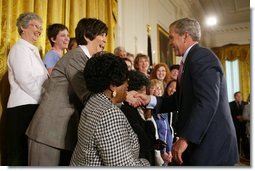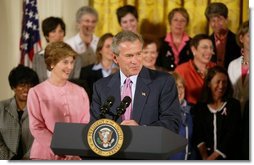|
Home >
News & Policies >
April 2004
|
For Immediate Release
Office of the Press Secretary
April 21, 2004
President and Mrs. Bush Deliver Remarks at National Race for the Cure Reception
The East Room
4:38 P.M. EDT
MRS. BUSH: Welcome to the White House. I am the one who should be applauding you, the fighters and the survivors of breast cancer. I want to thank my friend, Ambassador Nancy Brinker, for being here, the founder of the Komen Foundation. Also, thanks to Dr. Lefall, and Susan Braun of the Komen Foundation, for leading the charge in research and treatment.
 The National Race wouldn't be possible without the many sponsors
and volunteers who are there every step of the way, so thanks very much
to all of you for everything that you do. And I want to thank
Congresswoman Sue Myrick for being with us today. Thank you, Sue.
The National Race wouldn't be possible without the many sponsors
and volunteers who are there every step of the way, so thanks very much
to all of you for everything that you do. And I want to thank
Congresswoman Sue Myrick for being with us today. Thank you, Sue.
It's moving to see so much pink. It's also inspiring. Today the color pink symbolizes more than hope; it's a color of courage and triumph. A few years ago, a diagnosis of breast cancer left little hope for recovery. But thanks to the work of so many, and to every one of you, more women and men are defeating breast cancer and beating the odds.
The Komen Foundation has invested more than $96 million annually for breast cancer research, education, and treatment. And the Foundation has supported some of the most significant medical breakthroughs in the last 20 years.
All of us know someone who has been touched by breast cancer. For me, this disease hit home when my mother, Jenna Welch, was diagnosed at age 78. My mother is fortunate; she had surgery and she's been cancer-free for six years. But more than 40,000 women and men will not win their battle with breast cancer this year. It's for them, and for the more than 200,000 Americans who will be diagnosed this year, that we race. And every mile of the race brings us closer to finding a cure.
Nancy Brinker has dedicated her life to this end. Twenty-two years ago when Nancy started the Susan G. Komen Foundation, in honor of her sister, breast cancer was rarely spoken of. But today, millions of women know the risk for breast cancer. And they have access to early detection, treatment and support.
And more people around the world, both survivors and supporters, are lacing up their running shoes and making a difference. In 1983, 800 people participated in the first Komen race in my home state of Texas. Today, the race is held in over 100 cities. With more than a million participants, the National Race is the largest 5K foot race in the world.
Last year, this race raised an astonishing $2.6 million, and thousands of runners are raising our chances for finding a cure -- runners like Judy Macon, who is an example for women who are newly diagnosed with breast cancer. A 20-year survivor, Judy does more than run on race day. As a nurse, she organized a low-income mammography and surgical program at the Columbia Hospital for Women. Judy said, "It's an honor to be recognized as a survivor on race day."
And she's honored to have remarkable women like Magdalena Bell by her side. Magdalena is running for her daughters and her grandchildren. After being diagnosed and undergoing chemotherapy at age 40, Magdalena has been an advocate for young Hispanic women. She volunteered at a local hospital to teach teenage girls about breast cancer. And she talks to women about the importance of early detection.
 We are incredibly proud of the Komen Foundation, and of the people
who fight breast cancer on race day -- and every day. When you cross
the finish line on June 5th, be proud that you are helping millions of
women and men make a new start in their lives, lives free of breast
cancer and full of hope.
We are incredibly proud of the Komen Foundation, and of the people
who fight breast cancer on race day -- and every day. When you cross
the finish line on June 5th, be proud that you are helping millions of
women and men make a new start in their lives, lives free of breast
cancer and full of hope.
Now I'd like to introduce a Race for the Cure runner, our President and my husband, George W. Bush. (Applause.)
THE PRESIDENT: Thank you. Welcome. Thanks for coming. Thank you, darling. (Laughter.) What she forgot to say was, a Race for the Cure-ex runner. I'm afraid my knees hurt. (Laughter.) But thanks for coming to the White House. I appreciate -- I appreciate your support in such an important cause.
I, too, want to thank Nancy Brinker. I picked her to be the Ambassador to Hungary, because I know her to be an accomplished, smart, capable woman. And she did a fabulous job as the Ambassador, and I'm real proud to call her friend. (Applause.)
She's a social entrepreneur. She uses her skills to advance humanity in a positive way. And she did so in the name of her sister, Susan Komen. And, Stephanie, I'm glad you're here -- Susan's daughter. Thanks for coming. Proud you're here. I bet you're proud of your old auntie. (Laughter.) That's good.
I appreciate Susan Braun being here. Susan, you're doing a fine job. Nancy was up for dinner the other night, and so I was asking her about how everything was going in the foundation. I said, have you found anybody who can run this thing? And she said, yes, Susan Braun, she's doing a heck of a job. So if you can meet her standards, you must be doing a heck of a job. (Laughter.) Thanks for your hard work.
LaSalle, it's good to see you, sir. Dr. LaSalle Lefall is the Chairman of the Board. Thank you for taking time to support this meaningful cause. I want to thank the other board members and supporters who are here, as well. Some of corporate America is represented here, supporting this fine foundation. Thanks for being a good corporate citizen for our country. Thanks for doing your duty and supporting such a fine cause.
My buddy, Ann Veneman, who is the Secretary of Agriculture, is with us. She's a survivor. I'm really proud of Ann. She's doing an excellent job as a member of my Cabinet. Glad you're doing well. Thanks for coming. (Applause.) I'm really glad Sue Ann Thompson is here. It's great to see you, Sue Ann. She's married to Tommy, who is not here. Better half of the family showed up. (Laughter.) Thanks for coming, Sue Ann. Really good to see you.
I appreciate Congressman Sue Myrick. I'm glad you're here. She's one of the co-chair of the House Cancer Caucus, along with Steve Israel. Thank you for coming, Steve. I'm proud you both are here. Sue brought her grandson, Jake, Jake Forest. I just thought I'd say his name so he would get on C-SPAN. (Laughter.)
It's good to see two other members of the Congress who have taken time to come out, offer their support -- Joe Barton from Texas, and Marsha Blackburn from Tennessee. Thank you both for being here. I'm proud you came, too.
I want to honor the cancer survivors who are here. We appreciate your courage and your steadfast strength, and your willingness to share your stories and your experiences with others.
The Susan G. Komen Foundation Annual Race for the Cure is now a national tradition. And it didn't take long to get there. As Laura mentioned, the race started -- she said her home state -- it also happens to be mine -- (laughter) -- in Dallas, Texas. And it didn't -- from '83 to now, that's a couple of decades and a year, and yet when you hear the Race for the Cure, everybody knows what you're talking about. It's kind of become the brand name for saving lives.
The Komen Foundation has invested nearly $500 million in the fight against breast cancer. That's really good. (Applause.) Laura recognized somebody by name. I am, too. Rana Kahl is with us. She participated in her first race eight years ago. She ran four years before being diagnosed on her 33rd birthday with breast cancer. And her first time at the race as a survivor was the day after her first chemo treatment. She's been the chairwoman of the National Race for the Cure's Survivor Committee for three years. She's lending her heart and her expertise.
Rana celebrated her fourth cancer-free anniversary last month, and she and her husband, Kevin, welcomed their first child last year. (Applause.) It's a beautiful story. She said, "Because of the work we do today, other lives will be saved," which is the spirit of the Komen Foundation -- "Because of the work we do today, others lives will be saved."
Approximately one in seven women in the United States will develop breast cancer over her lifetime. That means more than 200,000 women will be diagnosed this year. This government is committed to helping find a cure for breast cancer -- and it must be. The Department of Health and Human Services is spending $900 million on breast cancer research and preventative activities. I want to thank the members of Congress for your strong support.
My budget has proposed an increase for next year, as well. (Applause.) The budget includes $220 million for an early detection program, promotes mammography use, and helps low-income women afford screenings for breast cancer and cervical cancer. It also includes $768 million to aid breast cancer researchers at the National Institutes of Health. NIH is now conducting the largest trial ever of new early-detection technologies. This effort will help doctors target breast cancer at its most treatable stage. Early detection is essential. We're going to continue to work with the Congress to make sure that there is increased access to screening services.
This country is making progress on women's health issues. And I appreciate the leadership of Tommy -- Tommy Thompson at the Health and Human Services. Recently, the Komen Foundation honored Tommy -- it says here, Secretary Thompson -- (laughter) -- Secretary Tommy Thompson -- (laughter) -- with the Women's Health Advocate Award for his work in the area of breast cancer. I know you're proud of him, and so am I.
Secretary Thompson, I will continue to stand by you in your cause. We'll not rest, we'll work to make sure that we do everything we can to help save lives.
The National Race for the Cure is an aspiring example. It's a good example for a lot of others to watch. It's an example of courage and hope and faith, and I want to thank you for your involvement.
Have a great race this June. I wish I could join you. (Laughter.) God bless. (Applause.)
END 4:50 P.M. EDT
![]() Printer-Friendly Version
Printer-Friendly Version
![]() Email This Page
Email This Page


